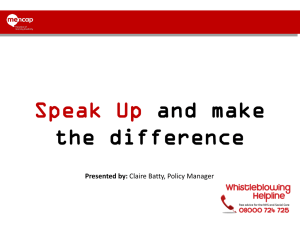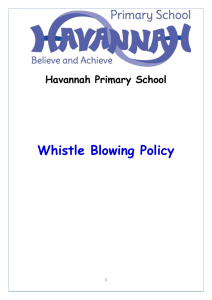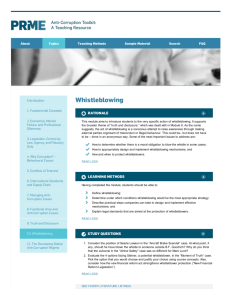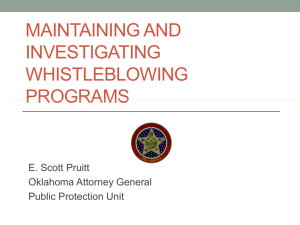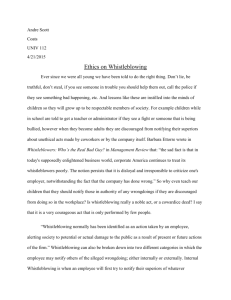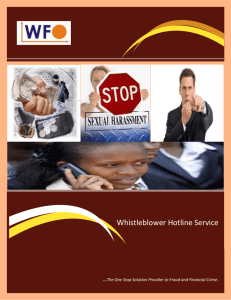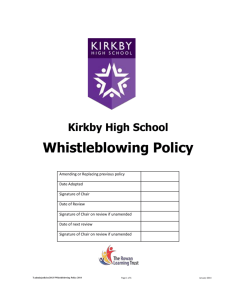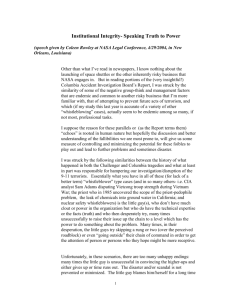- Greenwich Academic Literature Archive
advertisement
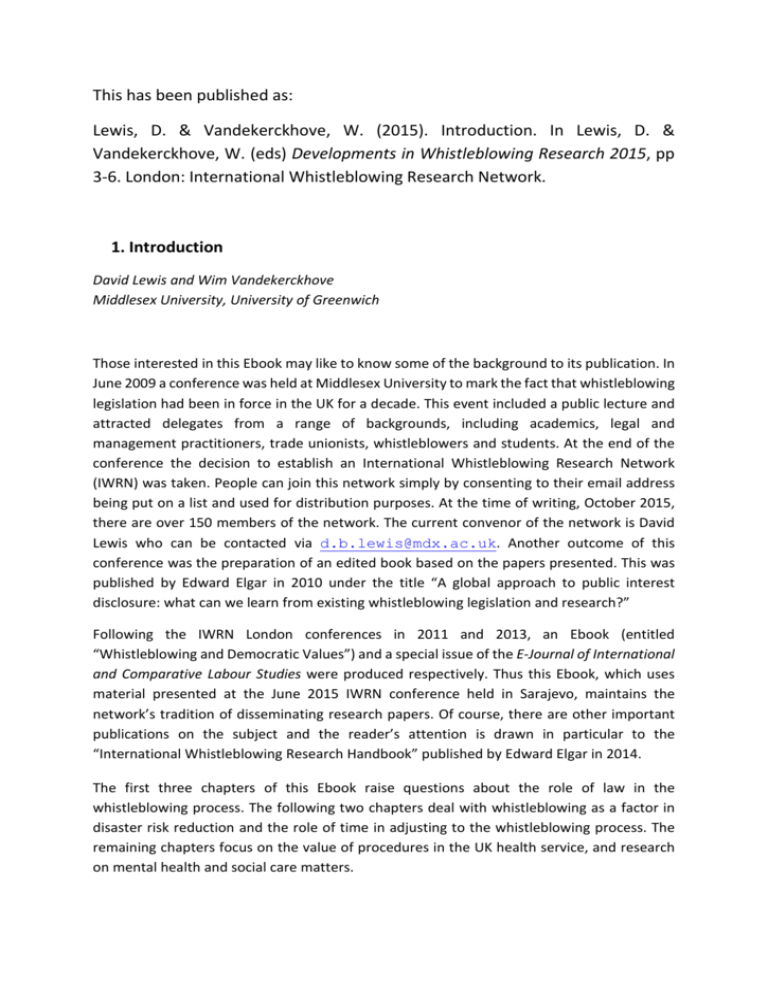
This has been published as: Lewis, D. & Vandekerckhove, W. (2015). Introduction. In Lewis, D. & Vandekerckhove, W. (eds) Developments in Whistleblowing Research 2015, pp 3-6. London: International Whistleblowing Research Network. 1. Introduction David Lewis and Wim Vandekerckhove Middlesex University, University of Greenwich Those interested in this Ebook may like to know some of the background to its publication. In June 2009 a conference was held at Middlesex University to mark the fact that whistleblowing legislation had been in force in the UK for a decade. This event included a public lecture and attracted delegates from a range of backgrounds, including academics, legal and management practitioners, trade unionists, whistleblowers and students. At the end of the conference the decision to establish an International Whistleblowing Research Network (IWRN) was taken. People can join this network simply by consenting to their email address being put on a list and used for distribution purposes. At the time of writing, October 2015, there are over 150 members of the network. The current convenor of the network is David Lewis who can be contacted via d.b.lewis@mdx.ac.uk. Another outcome of this conference was the preparation of an edited book based on the papers presented. This was published by Edward Elgar in 2010 under the title “A global approach to public interest disclosure: what can we learn from existing whistleblowing legislation and research?” Following the IWRN London conferences in 2011 and 2013, an Ebook (entitled “Whistleblowing and Democratic Values”) and a special issue of the E-Journal of International and Comparative Labour Studies were produced respectively. Thus this Ebook, which uses material presented at the June 2015 IWRN conference held in Sarajevo, maintains the network’s tradition of disseminating research papers. Of course, there are other important publications on the subject and the reader’s attention is drawn in particular to the “International Whistleblowing Research Handbook” published by Edward Elgar in 2014. The first three chapters of this Ebook raise questions about the role of law in the whistleblowing process. The following two chapters deal with whistleblowing as a factor in disaster risk reduction and the role of time in adjusting to the whistleblowing process. The remaining chapters focus on the value of procedures in the UK health service, and research on mental health and social care matters. Tom Devine uses his extensive knowledge and experience to identify international best practices in whistleblowing statutes. His material focuses on five main themes: the coverage of legislation, in particular the absence of “loopholes”; the possible forums for adjudicating whistleblowing rights; the tests a whistleblower must pass to prove that his or her rights have been violated; the remedies available for illegal retaliation and the issue of personal accountability; and the provision made for wrongdoing to be rectified. Finally, the author provides valuable lists of countries with dedicated whistleblower laws, those offering rights beyond the employment context and laws with significant national security or law enforcement “loopholes”. In their chapter, Richard Hyde and Ashley Savage examine new empirical data on the extent of transnational disclosure -sharing in a range of industries, identify two sets of challenges demonstrated by this data and offer some tentative suggestions. Whistleblower protection is particularly complicated in cross-border cases, with the home jurisdiction of the whistleblower potentially offering no protection from dismissal or detriment, or failing to contemplate transnational disclosures within its regime. Does this suggest a need for a minimal level of international protection is needed to ensure that such whistleblowers are not subjected to dismissal or detriment? Further, the concentration on the protection of a whistleblower through careful handling by enforcers or regulators may diminish with transnational sharing, as the relationship between the individual and the information becomes more remote. Second, the information disclosed by a whistleblower needs to be transmitted to the participant in a regulatory network who is best placed to address the concern. This is complicated in a transnational case, where sharing between agencies is not routine. Different languages, content and format may hamper sharing. Is there a need for international intervention to ensure that information can be shared more easily? How should sharing be monitored in order to ensure that the shared disclosure leads to positive outcomes desired by the whistleblower and the sharing agency? Flutura Kusari looks at whistleblowers’ rights in international missions and discusses the case of Maria Bamieh and Eulex (Kosovo). The chapter discusses the problematic application of international standards in this particular dispute. It assesses whether the EU has applied in Bamieh’s case the standards to protect whistleblowers established by the European Union, the Council of Europe, the European Court of Human Rights and other international instruments. Lastly, the chapter considers the whistleblowing procedures and protection mechanisms that Bamieh can employ to protect herself. Radu Ionescu argues that whistleblowing has the ability to provide information about hidden vulnerabilities and reduce the risk of disasters. First, he introduces the disaster management domain and identifies the growing threat of complex disasters. The key concepts of hazard, risk, vulnerability, and cascading disasters, are briefly explained. Having identified the need for disaster risk reduction, Radu then considers some features of whistleblowing which make it relevant in the quest to save lives and resources. The next section highlights the prevalence of organisational misbehaviour in disasters and discusses different approaches to the concept of risk. The final section discusses the appropriateness of including governance in whistleblowing/risk research. The author concludes with specific research questions which he suggests management can help to answer. Kate Kenny draws on empirical data from research into whistleblowing to show that time plays a fundamentally important role in how people see themselves and construct a sense of self, albeit with ambivalent results. When engaged in a long dispute with one’s organization, people’s interpretations of time can contribute to a slow and effective undoing of the self; perceptions of time act as an obstacle to effective resistance. At the same time and somewhat paradoxically, other more long-term interpretations of time relating to past and future selves, can alleviate the anxiety caused by the experience of whistleblowing and form a source of support. This chapter draws on insights from organization theory and contributes to research on whistleblowing retaliation and resistant identities, by highlighting the powerful influence of time on resister struggles, and pointing to the political implications of this. Prior to the 2014 Francis independent inquiry into whistleblowing in the UK health service, it had been argued that internal whistleblowing arrangements were desirable in principle i.e. that allegations of wrongdoing are likely to be dealt with more speedily without external pressure; that those raising a concern in accordance with a procedure were less likely to be victimised for disloyalty; and that such arrangements contribute to a form of organisational justice by providing opportunities for workers to use their voice. In the light of the data they obtained for this inquiry, David Lewis and Wim Vandekerckhove use their chapter to demonstrate that there is now empirical data which confirms that having a procedure and following it leads to better outcomes for both employers and whistleblowers. Thus the presence of a procedure is associated with it being more likely that concerns will be raised; if the matter was unresolved, following the employer’s procedure made it more likely that a concern would be taken further internally and that the whistleblower would be satisfied with the response; finally, adhering to a procedure was associated with the taking of advice, investigations being conducted and whistleblowers being praised for the action they took. In their jointly authored chapter, Marianna Fotaki and Kate Kenny build on existing studies of whistleblowing retaliation to argue that the concept of mental health can be used as a weapon intended to defame and neutralize a person who discloses wrongdoing. The chapter presents a new theoretical perspective on whistleblowing retaliation that draws upon poststructural and psychoanalytic thinking. It begins with an outline of existing literature on organisational retaliation, with a focus on the role of mental health. Next a theoretical framework is outlined, drawing specifically on Foucault’s analysis of the history of ‘madness’ and its role in processes of exclusion and ‘Othering’ of those deemed to be outside the social norm. This enables the authors to show how stigmatisation as a result of mental health struggles is not a ‘given’ but rather is historically contingent and laden with power. The authors develop a psychoanalytically-based perspective derived from Butler’s work on what constitutes liveable life that is worth protecting. They then examine their data on the experiences of whistleblowers in the banking and financial sector. In doing so, they illustrate how discourses of mental health were drawn upon by powerful organisations in order to construct the whistleblower as ‘abnormal’ and ‘other’. The authors conclude by proposing contributions to existing literature on whistleblowing research and organisation studies more generally. Angie Ash considers ethical issues raised by failures to act to stop the harm caused to citizens using health and care services, and presents a model to unpick this contextual complicity. The chapter draws upon the author's previous research which identified factors influencing social worker decision-making when dealing with the potential abuse of an older person. Among these factors was a professional unwillingness to rock the multi--‐agency boat that is adult safeguarding policy, and a reluctance to challenge poor care delivered in registered care homes. Social workers working with older people regarded these matters as everyday, unremarkable features of the resource-starved, fragmented service and regulatory framework in which they worked. These social workers did what they could to get by in the political, cultural and economic context in which they operated. Drawing on these research findings, the ethical model presented addresses this ‘contextual complicity’, as well as the conundrum that is whistleblowing in health and social care: why legislation, policies, procedures, the proliferation of regulatory paraphernalia, along with professional duties to report wrongdoing, fail both to protect the public and the professional who raises concerns. Taking as its foundation the contexts within which health and social care is delivered, this ethical model maps out how those contexts might cease to be complicit in poor care, and instead become cultures where speaking out about poor care becomes unremarkable. The contributions in this Ebook indicate that the links IWRN maintains with whistleblowers, campaigners, advisers, and policy- makers ensure that whistleblowing research remains rooted in social realities. At the same time, this collection of chapters show whistleblowing research is entering a new era, building on research legitimating whistleblowing as pro-social behaviour, and taking it into areas of management and governance. This is an important broadening of the field, not only in terms of increasing research possibilities but also with regard to connecting with and influencing other research. Whistleblowing research is moving beyond analysing discontent and protest to also making an impact on good practice.
